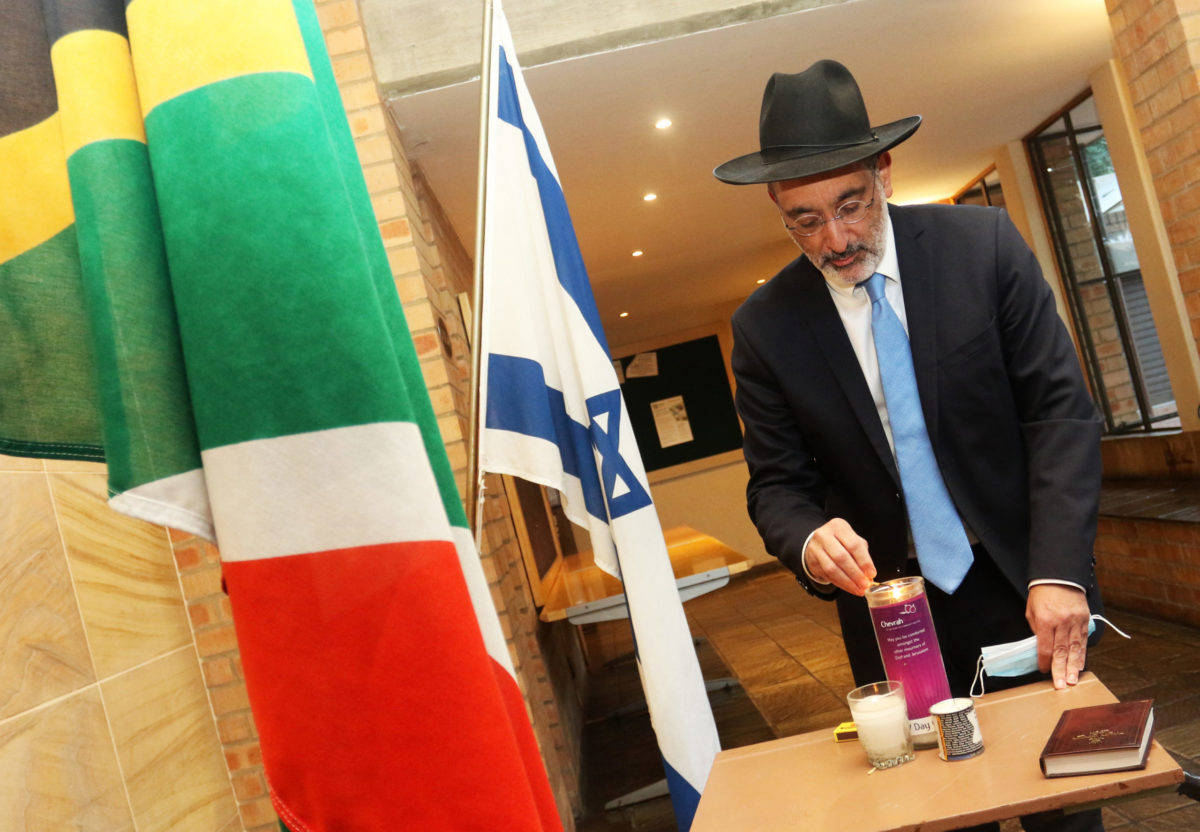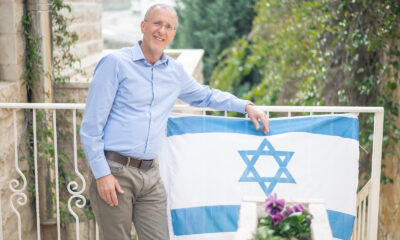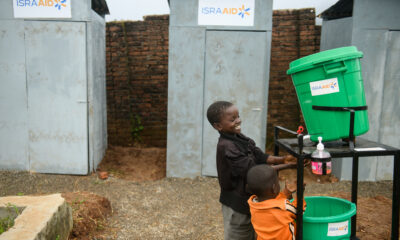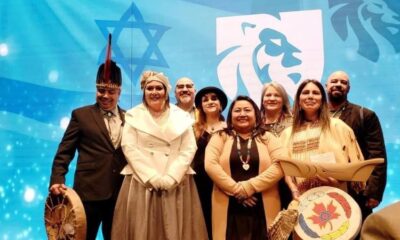
Banner

Mount Meron tragedy devastates South African family
Yohanatan Hevroni was so excited about going to Mount Meron for Lag B’Omer after not having been there for seven years, he arranged a bus for his community to get there. This time, he went as a beloved husband and the father of three girls. He wouldn’t return alive.
The 27-year-old tzaddik who lived in Givat Shmuel in central Israel leaves behind his children and wife, Tanya Hevroni (nee Taback), who made aliyah with her family from Johannesburg in 1997.
Hevroni was one of the 45 people who died senselessly in a stampede at the annual Mount Meron Lag B’Omer celebrations on Thursday, 29 April, the largest peacetime tragedy in Israel’s existence.
Speaking to the SA Jewish Report from the shiva house on Tuesday, 4 May, Tanya’s brother, Eitan Taback, described how events unfolded.
“A rabbi told us that on the way there, Yohanatan said how amazing it was to see the influence a tzaddik had after he had died [referring to Rabbi Shimon Bar Yochai, whose life is celebrated by thousands on Lag B’Omer at Mount Meron]. And after Yohanatan passed, we saw the amount of influence he had on everyone around him – the children he taught, people with whom he learned Torah.
“At 03:00 on Thursday night, Yohanatan’s mother got a phone call from his phone,” said Taback. “They said ‘his phone had been found in Meron, but we can’t find him’. Immediately, search parties were sent to hospitals and Meron itself. No one had any answers. After searching everywhere, they decided, with heavy hearts, to check the morgue, and that’s where they found him.”
Kalanit Taub, a volunteer emergency medical worker with United Hatzalah of Israel, described the devastation she encountered at the scene. “We saw stretcher after stretcher coming up the hill, with people performing CPR on them as they were running. I just saw bodies lying on the ground to my left and right. They all looked completely whole, completely fine, no broken bones, no blood. When we learned about [dealing with] a mass casualty incident, the first thing you’re supposed to do is treat the injured because those are the ones you’re more likely to save. But I didn’t see anyone injured. All I saw was people who weren’t breathing, who didn’t have a heartbeat. I thought, ‘Where are the injured people? Everywhere you look, everybody’s dead!’
“There was nothing we could do for any of them, we all tried our hardest, and we were completely unsuccessful,” she said. “The line of bodies kept getting longer and longer. Within seconds, they were out of body bags. We were taking thermal blankets to cover these people. And then we were out of thermal blankets. We didn’t have anything to cover the bodies with. There were just too many of them.”
Taub is also a member of the psycho-trauma unit. “I walked up the hill, and there were so many people in shock. People screaming hysterically, staring into space, and lying on the ground in foetal positions, unresponsive. I probably treated a hundred psycho-trauma patients. Meanwhile, [community emergency response team] ZAKA set up a tent that became the station where all the lost kids went. They were just naming kids one after the other separated from their parents. But not all were reunited because some of those parents died.”
By a miracle, Hevroni’s family managed to arrange his funeral for that day at 17:00. Because it was just before Shabbat, they expected few people to attend. But thousands arrived to pay their respects.
“The extent of his impact on people was so clear,” said Taback. “One rabbi bought a book of poems that Yohanatan wrote. They were about the simple things in life, and recognising the good in all other human beings. One of his students shared how he came to learn with Yohanatan and be inspired by him, but after their lesson, it was Yohanatan who told his student that he was inspiring.”
He described his brother-in-law as a “quiet guy, with a gentle soul, who always had a huge smile on his face”. He and Tanya married in Israel and went on to have three daughters, aged six, four, and two. They celebrated their eldest daughter’s sixth birthday a few days before the tragedy. “It would be the last celebration we would have together. There was so much happiness,” Taback said.
Two years ago, the family faced a major crisis when Tanya was diagnosed with cancer. “Yohanatan was there the whole time. He was a full-time father and mother. Now it’s the other way around. Tanya will have to be both the mother and the father.”
He said his parents, Ofra and David Taback, have been by his sister’s side from the moment they heard that Yohanatan was missing. “My parents are strong. They’re trying to be there for Tanya and the family. They’ve been here night and day.” Family around the world have joined in their grief.
Taback said his sister is devastated, but the support of the community had helped tremendously. “One thing we can take from this is that the Jewish nation will always unite in these situations. We must be there, one for each other, as brothers and sisters are meant to be,” said Taback. “Just be good to each other. We don’t need to wait for disasters to unite us. As the Jewish people, that’s who we are.”
Meanwhile, young South Africans on a gap year in Israel said the disaster had hit close to home. Many of their contemporaries attended the celebrations at Mount Meron. Dean Chaitowitz, who is at Yeshiva Eretz HaTzvi in Jerusalem, said he would have been there if enough boys from his yeshiva wanted to go.
“It wasn’t an official yeshiva trip, but they said that if there are enough kids, they’ll organise a bus to go. I’m trying to absorb as much of Israel as possible on my gap year, so I wanted to go. But in the end, there wasn’t enough of a demand. I was upset that I didn’t go, but when we found out what happened, I was shocked. I could easily have been there; our whole group would have gone. Hearing about yeshiva boys getting killed really hit hard, just knowing that it could literally have been any of us.”
Dani Sack who studying is at the Midreshet HaRova seminary in Jerusalem, said, “My group wasn’t going to go to Meron, but hearing about the tragedy nonetheless was a huge shock to the system, especially since some of our friends were planning to go.
“It was jarring considering we’d been so close to Meron, and also celebrated with dancing and singing that night. The fact that so many of those wounded and killed were young people put into perspective the magnitude of what a gap year entails. Being away from family is scary enough, but to think that a simple celebration on Lag B’Omer could turn deadly is terrifying.
“At Midreshet HaRova, we sang and said tehillim at the Kotel in honour of those who were killed. All the Torah we learned on Sunday was l’iluy nishmat [for the elevation of the soul] of the 45 we lost. In Israel, the mood over Shabbos and the weekend was solemn. You could feel the loss in the air. It’s really surreal being here during this moment, something that the Jewish national will remember forever.”
To support the family of the late Yohanatan Hevroni, please visit: https://givechak.co.il/yeonatan/en











Boghos L. Artinian
November 6, 2021 at 4:09 pm
Venues vulnerable to stampedes should have multiple waist-high solid barriers 4 to 5 meters apart to prevent the buildup of lethal horizonal human pressures.